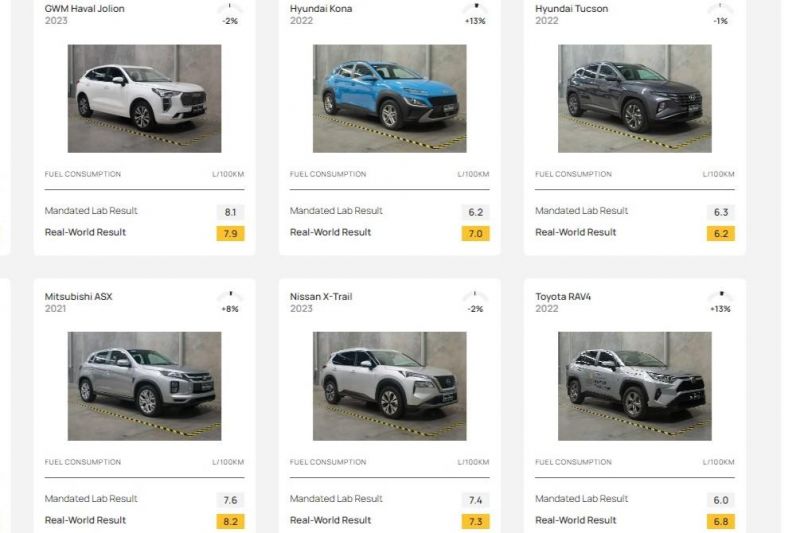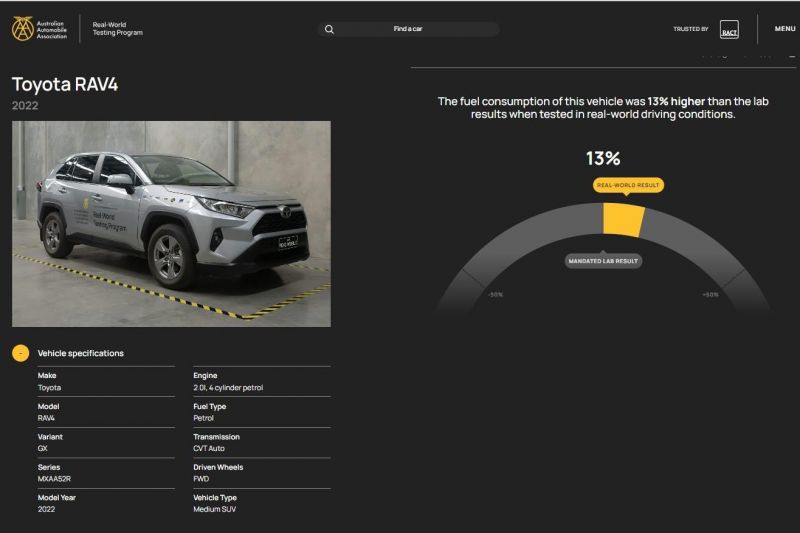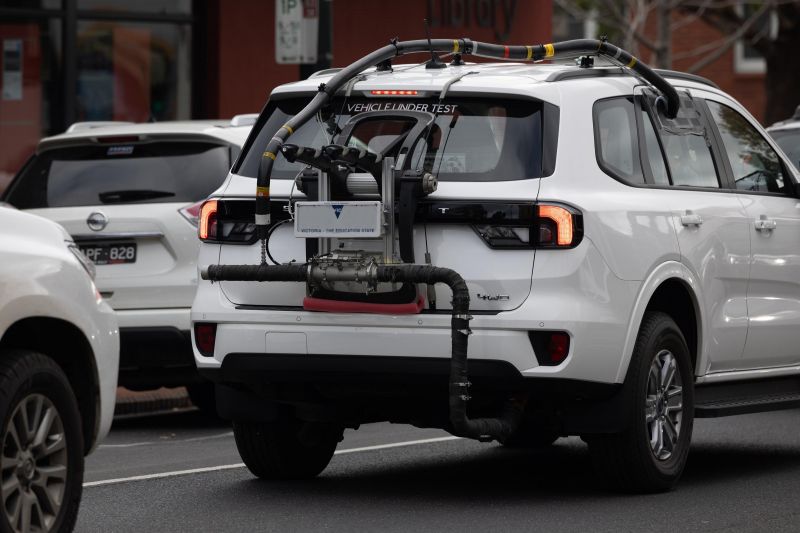The Australian Automobile Association (AAA) has published the first results in its government-funded real-world fuel economy testing program, focusing on big-selling small and medium SUVs.
The program compares new and scientifically rigorous on-road economy results with the official ADR figures listed on each car’s windscreen sticker – which are based on laboratory tests.
Six of the vehicles in the real world performed worse than their efficiency claims (by up to 13 per cent) but three of the vehicles performed better on the road than in the lab.
Those that under-promised and over-delivered were the Nissan X-Trail (2.0 per cent better than claim), Haval Jolion (2.0 per cent better than claim), and Hyundai Tucson (1.0 per cent better than claim).
The worst performers were the now previous-generation 2022 Hyundai Kona, which used 13 per cent more petrol in real-world testing than its lab result, and the Toyota RAV4 petrol, which likewise exceeded its claim by 13 per cent.
The Mitsubishi ASX, the MG ZS, and the Ford Puma all exceeded their lab test claims by 8.0 per cent in the real world. The Toyota RAV4 hybrid exceeded its claim by 2.0 per cent.
Results
| Model | ADR claim lab test | AAA real world test |
|---|---|---|
| Nissan X-Trail petrol | 7.4L/100km | 7.3L/10km |
| GWM Haval Jolion petrol | 8.1L/100km | 7.9L/100km |
| Hyundai Tucson diesel | 6.3L/100km | 6.2L/100km |
| Toyota RAV4 hybrid | 4.7L/100km | 4.8L/100km |
| MG ZS 1.5 petrol | 7.1L/100km | 7.7L/100km |
| Mitsubishi ASX | 7.6L/100km | 8.2L/100km |
| Ford Puma | 5.3L/100km | 5.7L/100km |
| Hyundai Kona 2.0 petrol | 6.2L/100km | 7.0L/100km |
| Toyota RAV4 petrol | 6.0L/100km | 6.8L/100km |
Why these cars are being tested
Have you ever read your car’s fuel consumption and emissions sticker on the windscreen and wondered why you can’t seem to match it? You aren’t alone.
Fuel economy and emissions results labelled under Australian Design Rule 81/02 are generated in laboratory testing. But with so many variables affecting fuel use in the real world, they’re best viewed as comparative figures.
The AAA is the peak body for Australia’s state-based motoring clubs such as the NRMA, RACV and RACQ, which altogether have a claimed 8.9 million members.
Its Real-World Testing Program intends to test 200 cars in real-world driving conditions over four years, and “quantify how each vehicle’s fuel economy and emissions performance varies from the laboratory test results reported at point of sale”.
The pilot program of 30 vehicles tested back in 2017 found on average the cars consumed 23 per cent more than was found in their lab tests and published on their yellow stickers. One of the vehicles tested used 59 per cent more.
Since this time the lobby group has been calling for real-world testing. The Federal Government kicked in $14 million to fund the program, which is conducted from a facility in Geelong and on public roads.
The AAA contends the Volkswagen emissions scandal (Dieselgate) in which Volkswagen vehicles used software to trick lab tests, first showed real-world testing was needed, and claims real-world data is important during the cost-of-living crisis for households and for fleets alike.
“Australian car buyers have for too long been misled regarding their vehicle’s fuel consumption and environmental performance,” said AAA managing director Michael Bradley.
“This Program will deliver Australians truth-in-advertising and drive down demand for cars that over-promise and under-deliver. Better information will enable families and fleet buyers to buy vehicles that will meet their budget and environmental requirements.
“The AAA is very grateful for the Government’s support, which will save consumers money, while benefiting the environment.”
MORE: More realistic fuel efficiency testing now underway in Australia



